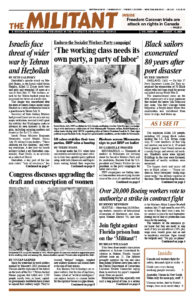SEATTLE — More than 20,000 Boeing workers, members of International Association of Machinists and Aerospace Workers District 751, met here at the Mariners Major League Baseball stadium July 17 and voted by over 99% to strike if they don’t have a new, better contract in place by mid-September. Boeing had to shut its production lines down for the meeting.
The workers let the aerospace giant know that they are ready to stop work if they are not offered a 40% plus wage raise, benefit gains and an end to mandatory overtime. Signs around the ballpark read, “No pay, no planes” and “Paid medical now! Pension now. COLA.” On Sept. 12, workers will vote on any Boeing contract offer and take a second strike vote.
“We come to get what we deserve. We haven’t had a contract negotiation in 14 years,” mechanic Kenneth Chestay told the Militant outside the stadium. “With inflation our wages didn’t go up. Rent, gas and food are too expensive. People have to work overtime to make ends meet. We can’t afford a home.” The lowest paid mechanics at Boeing get $23.50 per hour.
The union has been locked into its current contract for the past 16 years. Under company pressure over jobs, it has made concessions since then.
Workers fear for their job security after a series of disasters resulting from the dog-eat-dog profit drive of Boeing’s bosses. “The bad decisions made at the executive level of the Boeing Company are short-term decisions with long-term consequences,” IAM District 751 President Jon Holden said after the vote. “We are fighting to change this company and to save it from itself.”
Cutting costs to boost income led to the deadly crashes of two 737 Max 8 jets, one in 2018 on a Lion Air flight in Indonesia killing all 189 people on board and another in Ethiopia the next year killing all 157.
The cause for both crashes was a software glitch the bosses knew about but covered up that pushed the planes into a dive. The U.S. government bears some responsibility, because it handed over Federal Aviation Agency responsibility for oversight to Boeing’s bosses.
Then this past January, a door plug flew off Alaska Air Flight 1282 at 16,000 feet, causing an uncontrolled decompression. The crew was able to stabilize the plane and make an emergency landing back in Portland, Oregon. It turned out the plug had been improperly installed, but Boeing had “lost” all records of how that happened.
The workers are fighting to exert more control over production.
Boeing firefighters set an example
In early May Boeing got a taste of the workers’ readiness to fight after the bosses locked out the in-plant fire department and medical response workers. These unionists, members of International Association of Fire Fighters Local I-66, held spirited picket lines at various company facilities and won support from fellow Boeing workers, truckers, rail workers, area firefighters and other working people. Boeing has a string of manufacturing plants and other facilities throughout the Puget Sound region.
On May 28 the firefighters won pay raises up to more than $21,000 a year, four hours overtime pay in their 24-hour shifts, accelerated progression to full pay and other benefits.

